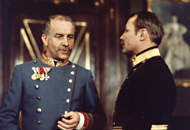"Can we create truely beautiful?"
What troubles Hofmannsthal, it seems, is the inability of mankind to be "perfect". Being deeply Platonian, Hofmannsthal believes that there is a perfect (or "true") form of art and beauty, which unfortunately cannot be achieved simply by writing, painting, or other forms of art. The passage quoted in Janik and Toulmin (p.116) seems to sum this up well: "images and concepts only lead back to themselves...everything is in a state of harmony and beauty, but they are "eyeless statues" which surround him, forms without genuine relation to existence" (116).
Because he believes that there is a form that "ought to be" (although he does not know what it actually is-- it is an ancient and a true knowledge that only our souls remember, as Plato explains), he feels a certain distance from art, or alienation from these "beautiful" artifacts. Objects that the merchant's son collects is therefore not beautiful in itself, but its beauty only lies in the history it has: " his days were more beautiful and less empty among these objects... a great legacy, the divine work of all the generations".
What is conveyed in "The Tale..." is a sense of loneliness and a distance form reality. Although the merchant's son is attracted to beautiful things and collects them, it gives him a "thought of death". Also, he keeps several servants in his house but he does not interact with them. Things that are not beautiful seem to be more real and closer to the merchant's son. For example, he cannot get his attention away from "thin lips" or bared teeth of the horses: features that he describes as "evil", far from beautiful.
Considering that his era was obsessed with "beautiful" things, decorations, and art, Hofmansthal's writing seem to show a certain distress for the inability to become one with the "truly" beautiful.



No comments:
Post a Comment